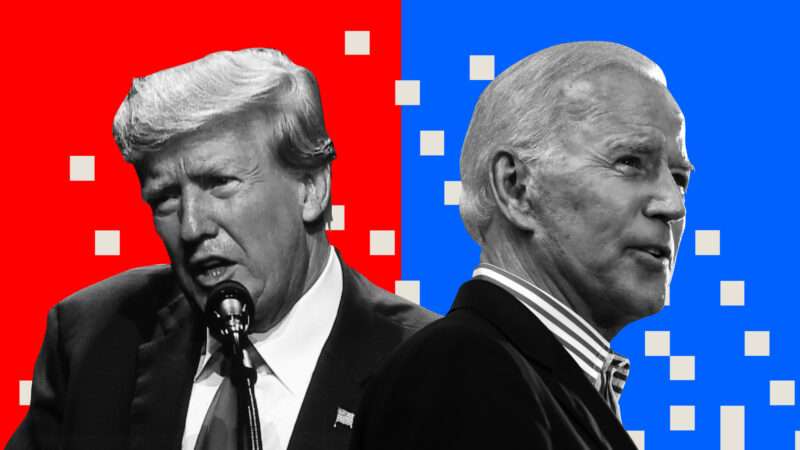
Amidst campaign discord, a bipartisan idea is emerging: America can set aside taxpayer dollars for special projects and brand it a national "wealth fund" to help improve public perception of the national debt and deficit spending.
Speaking at the Economic Club of New York last Thursday, former President Donald Trump asked, "Why don't we have a sovereign wealth fund? Other countries have wealth funds. We have nothing." He suggested that this new account would be capitalized with "tremendous amounts of money" that the federal government would take in by imposing tariffs and "other intelligent things," and that the United States would have the "greatest sovereign wealth fund of them all." How big might it be? Trump did not specify, but said he would consult with billionaire hedge fund manager and adviser John Paulson. In a separate interview, Paulson said, "it would be great to see America join this party and, instead of having debt, have savings."
An appealing aspiration to be sure, though scarcely conceivable in the foreseeable future. He referenced Norway's $1.7 trillion wealth fund as a potential goal. That may sound like a lot of money—until one considers that the U.S. federal government spends that much in just four months. It is hard to fathom how it would be the basis of a long-term and meaningful store of national wealth in the context of the U.S. economy. (Norway has a population of just 5.6 million, so it's very meaningful there.)
A fund that size would amount to barely 4 percent of the accumulated $35 trillion U.S. national debt. Trump predicted that the proposed wealth fund would "return a gigantic profit," which would help pay down the debt. That profit would have to be gigantic indeed—on the order of a 20-fold return, and soon—to offset our national debt. And that's assuming the debt didn't continue to increase in the meantime due to our structural deficits, currently running in the range of $2 trillion annually. We are effectively adding more than an entire Norwegian wealth fund to the national debt every year. In the annals of investing history, it would be a pretty impressive achievement for a pool of capital to appreciate at a rate sufficient to offset our preexisting and accumulating debt, if not totally unprecedented at this scale.
As for the Biden-Harris Administration, Bloomberg reports that "top aides to President Joe Biden have been crafting a proposal to create a sovereign wealth fund," which they are eager to formalize in the remaining months of the administration. While senior administration aides are reportedly debating "the size, structure, funding, leadership, and potential guardrails for a proposed fund," no details were provided on how it might be possible to capitalize it.
Ironically, during the Economic Club luncheon's question and answer period, it was Trump's adviser Paulson himself who said that under Trump's economic plan, the deficit "would come down from items such as increased revenue from tariffs" but would be offset by lost revenue from not taxing tips. "What do you estimate will be the impact of the fiscal deficit from your policies?" Paulson asked the former president. Trump responded that the nation's current deficit is "crazy…it's just horrible actually," but he did not indicate how or by how much it might decline, let alone turn into a surplus under his leadership.
Unless Trump has such a plan, the prospective returns of this new wealth fund would have to be even more implausibly grandiose to contribute to our wealth relative to the magnitude of debt we continue to incur. And note from Paulson's question, in his thinking, he has apparently already allocated the predicted new tariff revenues to contain the annual deficit, not to be the seed capital of our new national wealth fund as Trump suggested. Fiscal realities being what they are, it is extremely unlikely that discretionary funds of that magnitude will be available to the government anytime soon. Without a substantial reset of the U.S. budgetary structure, an American sovereign wealth fund could likely be launched only with borrowed money.
Notwithstanding the inherent contradiction of launching a supposed "wealth fund" with borrowed money, it would not be shocking if bipartisan political momentum takes us there.
In addition to pretending that wealth can be created through slogans, both Biden and Trump seem especially allured by having access to a newfound store of "wealth" for their own favored priorities, outside regular congressional oversight. Biden officials reportedly think this fund could "help bolster US interests by providing first loss equity capital, guarantees, or bridge financing to illiquid but solvent companies competing with Chinese firms."
Trump, for his part, said he seeks to "build extraordinary national development projects in everything from highways to airports and to transportation, infrastructure—all of the future. We'll be able to invest in state-of-the-art manufacturing hubs, advanced defense capabilities, cutting-edge medical research and help save billions of dollars in preventing disease in the first place."
So, there is unity after all. Both parties are eager to create new language to hide our fiscal problems while directing a few trillion dollars to the most complex economic projects imaginable without oversight. Who says the two parties can't work together?
The post Trump and Biden Agree: Just Call Debt 'Wealth' Instead! appeared first on Reason.com.







